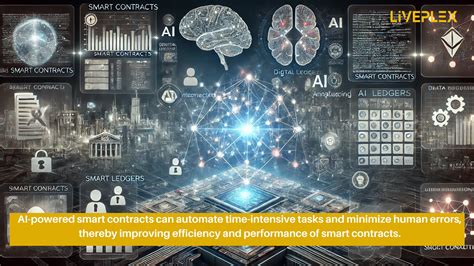Smart Contracts and AI: A New Paradigm for Digital Agreements
The World of Digital Agreements is undergoing a significant transformation with the Advent of Blockchain Technology and Artificial Intelligence (AI). Traditional contracts, once confined to physical documents or manual processes, are now being replaced by sophisticated software-based systems that automate the negotiation, execution, and enforcement of agreements. In this article, we’ll explore the role of smart contracts and ai in shaping a new paradigm for digital agreements.
What is a smart contract?
A smart contract is a self-executing program that automates the negotiation, execution, and enforcement of agreements between parties. It is based on a set of rules and logic defined by software, which are executed automatically upon specific triggers or conditions. Unlike traditional contracts, which rely on human intervention and negotiation, smart contracts eliminated the need for intermediaries, such as lawyers or brokers.
the benefits of smart contracts
Smart Contracts Offer Several Benefits Over Traditional Agreements, Including:
- Automated enforcement : Smart contracts can enforce rules without the need for intermediaries, ensuring that all parties comply with the agreement.
- Transparency : Smart contracts provide a clear and audited record of all events and decisions made within the contract.
- speed : Smart contracts can automate the negotiation process, reducing the time it takes to finalize agreements.
- Cost savings
: Smart contracts eliminated the need for lawyers and other intermediaries, resulting in significant cost savings.
The Role of Ai in Smart Contracts
Artificial Intelligence (AI) Plays a Crucial Role in Smart Contracts by Enabling Them To Analyze Complex Data, Identify Potential Risks, and Make Predictions About Future Events. AI CAN:
- Analyze Data : AI can process vast amounts of data, including contract terms, customer information, and market trends.
- Identify patterns : AI can recognize patterns within the data, identifying areas where smart contracts may need to be updated or modified.
- Make Predictions : AI Can Predict Potential Risks and Opportunities, Allowing For More Informed Decision-Making.
Examples of Smart Contracts with AI
- Supply Chain Management : Smart contracts can automate the payment process for goods and services, reducing the risk of non-payment and improving logistics efficiency.
- Insurance : AI-powered smart contracts can assessment claims quickly and accurately, reducing administrative costs and improving customer satisfaction.
- Real Estate : Smart Contracts can Facility Property Ownership Transfers, Reduce Paperwork, and Increase Security.
Challenges and Limitations
While Smart Contracts and Ai Offer Significant Benefits, they also present Several Challenges and limitations, including:
- Complexity : Smart Contracts Require Sophisticated Programming Knowledge to implement effectively.
- Interoperability : Smart contracts must be able to interact with existing systems and infrastructure.
- Regulation

: The Regulation of Smart Contracts and ai is still in its infancy.
Conclusion
Smart contracts and ai are revolutionizing the world of digital agreements, offering a new paradigm for efficient, transparent, and second transactions. As these technologies continuue to evolve, we can expect to see more sophisticated applications in various industries. By understanding the benefits and limitations of smart contracts with AI, businesses and individuals can harness their power to create innovative solutions that Improve Efficiency, Reduce Costs, and Enhance Customer Experiences.
